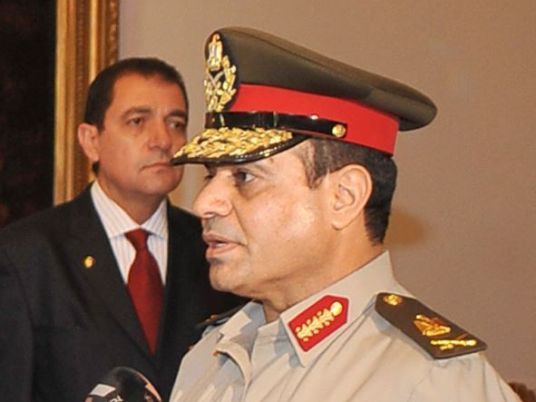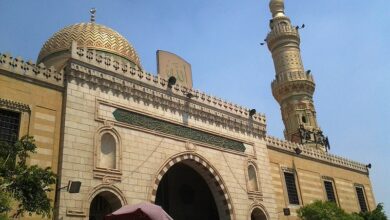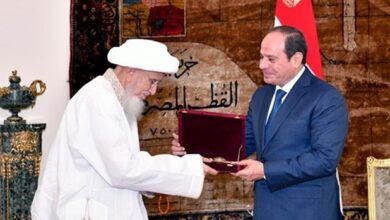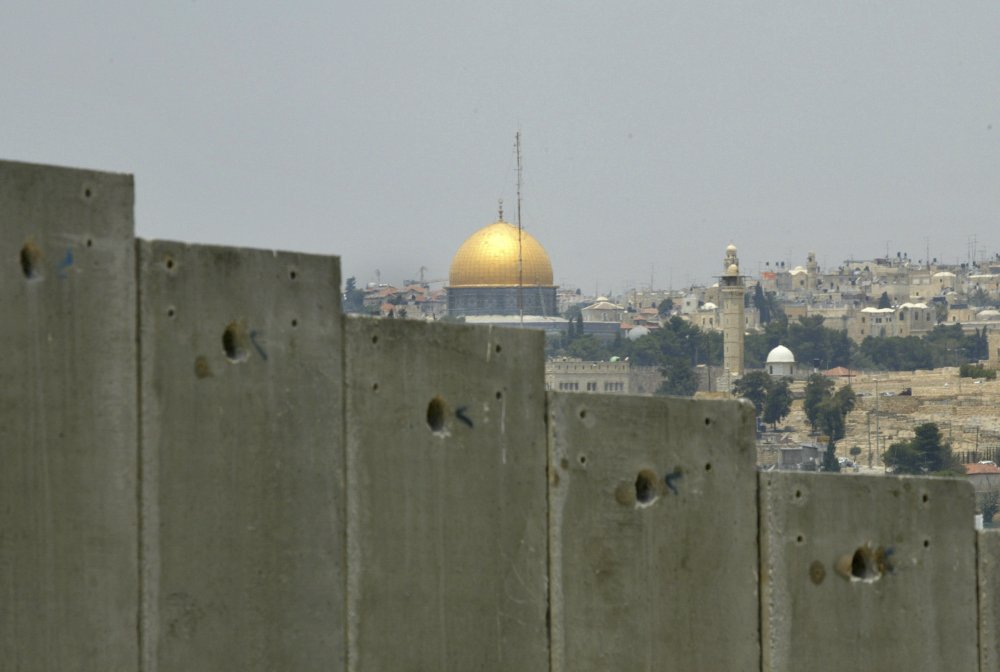
Egyptian presidential frontrunner Abdel Fattah al-Sisi on Monday appeared to rule out reconciliation with the Muslim Brotherhood movement, raising the spectre of a prolonged conflict with a group he said was finished.
Sisi, who ousted the Brotherhood's Mohamed Morsy from the presidency last July after mass protests against Morsy's rule, accused the Brotherhood of links to violent militant groups, adding that two plots to assassinate him had been uncovered.
"I want to tell you that it is not me that finished (the Brotherhood). You, the Egyptians, are the ones who finished it," Sisi said in a joint interview with Egypt's privately owned CBC and ONTV television channels broadcast on Monday.
Asked whether the Brotherhood would cease to exist during his presidency, Sisi answered: "Yes. That's right."
Sisi is expected to easily win the 26-27 May presidential election. The only other candidate is leftist politician Hamdeen Sabahi, who came third in the 2012 election won by Morsy.
Sisi's supporters view him as a decisive figure who can stabilise a country plagued by street protests and political violence since an army-backed popular uprising toppled President Hosni Mubarak in 2011.
The Brotherhood, which says it is committed to peaceful activism, has accused Sisi of staging a coup and masterminding the removal of Morsy, Egypt's first freely elected president.
Sisi, a head of military intelligence under Mubarak, confirmed rumours that there had been attempts on his life, highlighting the security challenges facing Egypt, a strategic US ally in the heart of the Arab world.
Sisi said there were "two attempts to assassinate me. I believe in fate, I am not afraid."
An Islamist militant insurgency has been growing since Morsy's overthrow. Islamist militants have killed several hundred members of the security forces in bombings and shootings. The interior minister survived an attempt on his life in September.
The army-backed authorities have outlawed the Brotherhood, which won all the elections after Mubarak's fall. Thousands of its supporters have been arrested and hundreds killed. Top leaders, including Morsy, are on trial.
A court sentenced the leader of the Brotherhood, Mohamed Badie, and hundreds of supporters to death last week. Secular dissidents have also been jailed, leaving little organised opposition to the army-backed government.
Although the Brotherhood is under severe pressure, Egypt's oldest and most organised Islamist movement has survived repression under successive rulers from the military, starting with Gamal Abdel Nasser in 1954.
Sisi has said his campaign would be unconventional – an apparent reference to concerns for his security. So far, there are no announced plans for him to appear in public.
Old enemies
Islamists and the Egyptian state are old foes. Militants assassinated President Anwar al-Sadat in 1981 mainly because of his peace treaty with Israel. Mubarak also survived assassination attempts.
Sisi said security, stability and development are his priorities for Egypt, a nation of 85 million people who live on 4.5 percent of the country's land. But he gave no details of his vision for the economy in the interview being broadcast in installments.
Egypt's military has mounted several offensives against militants based in the Sinai. But fighters who have established bases in the unruly peninsula near Israel have proven resilient.
Hardening accusations against the Brotherhood of militant ties, Sisi said one of its leaders had warned him last July against his course of action, saying fighters would come from Syria, Afghanistan and Libya "to fight the Egyptians and to fight you".
His tough line on eradicating militancy may not be enough to ease the concerns of Egyptians.
In a country where protests have helped lead to the removal of two presidents in three years, Sisi may be expected to deliver quick results, especially for the economy, which suffers from a weak currency, high unemployment, a bloated public sector and a widening budget deficit.
Sisi also expressed his support for a law criticised by rights groups for imposing tight restrictions on the right to demonstrate. "I say that anything needed for security and stability we will do."
He appeared to acknowledge human rights abuses reported by human rights groups during the security campaign.
"We must understand that there cannot be a security situation with this depth and confusion that we are seeing, without some violations," he said. "There is law and procedures taken so that this does not happen again."




